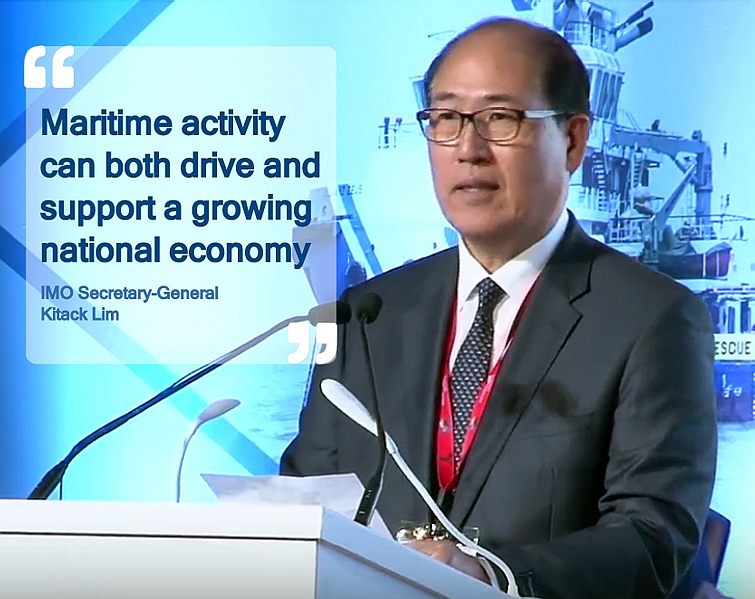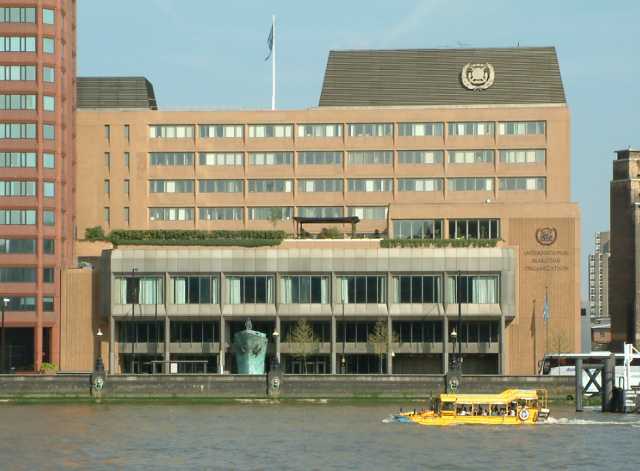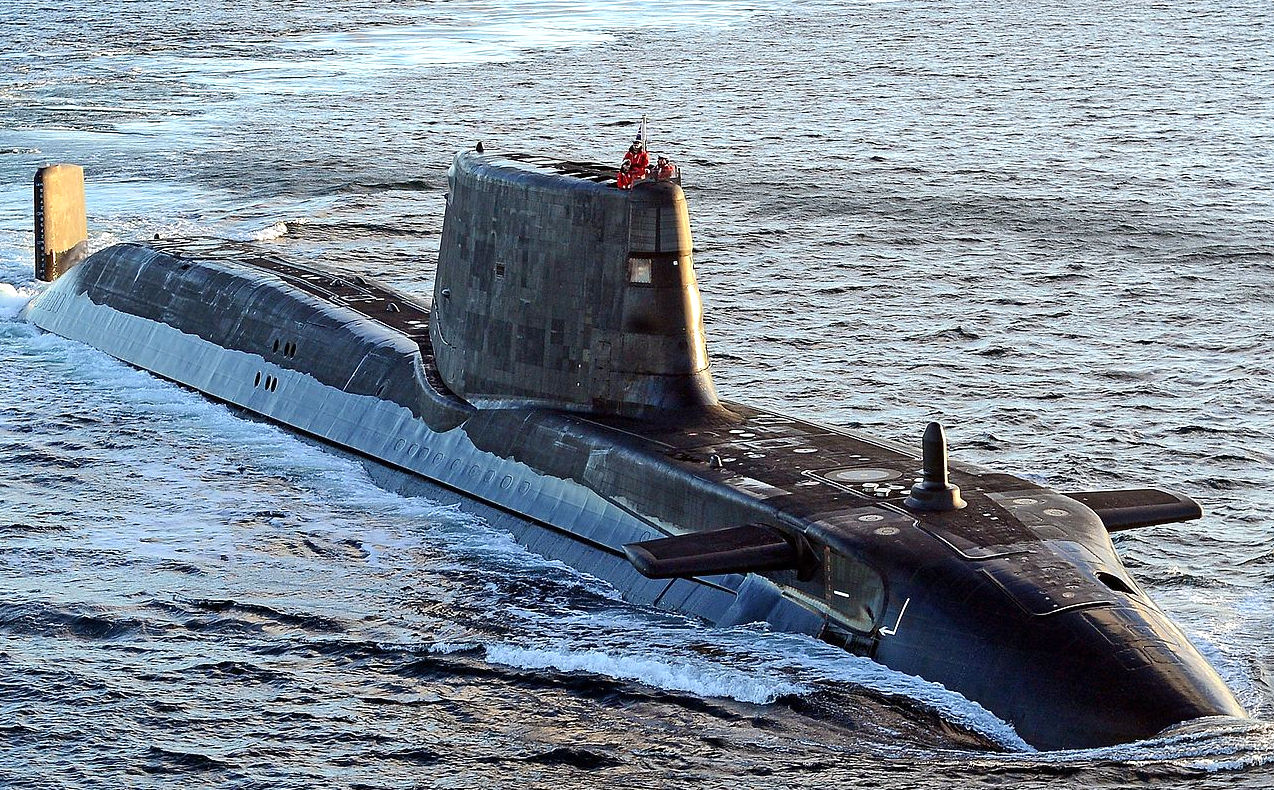|
KITACK
LIM - IMO
SECRETARY GENERAL
ATLANTIS
STORY
MAP &
OPERATION HOMEPAGE

Kitack Lim (Republic of Korea) is the eighth elected Secretary-General of the International Maritime Organization.
Mr Lim was elected
Secretary-General of the Organization by the 114th session of the IMO Council in June 2015 for a four-year period beginning 1 January 2016. The election was endorsed by the IMO's Assembly at its 29th session in November 2015.
At its 31st session (November-December 2019), the Assembly approved the renewal of Mr. Kitack Lim's appointment as Secretary-General of IMO, for a second and final term of four years (1 January 2020 to 31 December 2023).
In this fictional John
Storm, ocean awareness adventure, the
conversations between the characters are not real, but supposed, as
being possible should events that are described, come to pass.
The
UN Secretary General and IMO's Kitack Lim, are keen to find out more
about the capabilities of the Elizabeth
Swann craft, once they've seen the sleek trimaran in operation. As
they put it, nobody could fail to be impressed. Their only concern is to
scalability. Could the Swann's formula be applied to cargo ships. Could
the world's shipping fleets run on green
hydrogen. In view of the limited time remaining in office, it is
likely that Mr Lim's future replacement will feature in this short
story, and subsequent screenplays.
UN
75th ANNIVERSARY 24 OCTOBER 2020
IMO Secretary-General Kitack Lim is quoted as saying:
"The International Maritime Organization (IMO) is proud to be part of the UN family.
The United Nations was founded 75 years ago on the basis of global solidarity and collaboration, to build a better world.
As we face the challenges of the COVID-19 pandemic, that spirit of cooperation, collaboration and communication amongst nations is needed more than ever.
In the maritime sector, we have been working together to try to resolve the crew change crisis facing seafarers stranded at sea. Shipping is delivering vital goods including
food and medicines during the pandemic and maritime trade will be the main driver for economic recovery.
At IMO, we will continue to work to support the aims and ambitions of the sustainable development goals, in particular, to ensure sustainable shipping for a sustainable planet. We will play our part to reduce
greenhouse gas emissions from shipping and support the battle against
climate
change. In conjunction with our UN sister agencies, the IMO has built an enviable record of progress to improve the safety, security and environmental performance of shipping, so vital to the world's
economy. That progress will continue.
I congratulate the United Nations on its 75th anniversary.
IMO will do all it can to support and uphold the UN values as we confront our common challenges and work together towards a better future."
OPENING SPEECH 17th MARCH 2020 PPR7 SUB
COMMITTEE ON POLLUTION PREVENTION & RESPONSE
Excellencies, distinguished delegates, good morning to you all.
It is a pleasure for me to welcome you to the seventh session of the Sub‑Committee on
Pollution Prevention and Response. I particularly welcome those delegates who may be attending this Sub‑Committee for the first time.
Distinguished delegates,
I would like to take this opportunity to say a few words about this year's World Maritime theme, which is "Sustainable shipping for a sustainable planet". This theme is intended to raise awareness of the United Nations'
Sustainable Development
Goals, the SDGs, and showcase the work that IMO is undertaking to achieve the targets set by the SDGs.
The year 2020 will mark the beginning of a decade of action and delivery for the SDGs, not only for shipping but for the global community as a whole.
The shipping industry, supported by the IMO regulatory framework, has already started the transition towards a sustainable future through the adoption and continuous development of measures to address very important issues, such as the reduction of greenhouse gas emissions, the lower sulphur content of ships' fuel oil, the protection of the polar regions and the wider participation of women in the maritime community.
I would like to remind you that the World Maritime Day will be celebrated at IMO Headquarters on 24 September, and the annual parallel event will be organized by the Government of
South
Africa, in Durban, from 28 to 30 October.
Distinguished delegates,
We are now into the second month of 2020 and I am pleased to say that all indications point to a relatively smooth implementation of the 0.50%
sulphur limit. I would like to express my sincere appreciation to IMO Member Governments, the shipping industry and all stakeholders, including shippers and the fuel oil supply industry, for their efforts so far and to ask for further cooperation to ensure IMO 2020 continues to be implemented properly and smoothly.
The next important target date is fast approaching, when carrying non‑compliant fuel oil on board ships becomes prohibited on 1 March 2020. I urge all shipowners, operators and masters to comply with the carriage ban, where applicable, when it comes into effect. IMO will remain vigilant and ready to respond and provide support as required.
The PPR Sub-Committee has been central to the aforementioned developments, and the hard work that all of you put in, particularly during the two previous sessions has meant that from a regulatory standpoint the necessary guidance was prepared, approved and issued in good time before 1 January 2020.
With this, I now turn to the items on your agenda this week and I would like to highlight some of the key technical issues you will be considering.
With regard to prevention of air pollution, specifically in relation to the requirements of
MARPOL Annex VI to limit sulphur oxides, you will need to finalize the draft guidelines for the verification of the sulphur content of the fuel oil carried for use on board a ship, to enable consistent implementation and enforcement of the upcoming prohibition on the carriage of non-compliant fuel oil. In addition, I urge you to complete the work on the revision of the 2015 Guidelines for exhaust gas cleaning systems to enhance their uniform application in light of recent technical developments and experience gathered from approvals and operation of such systems.
On a related note, you will commence the work on evaluation and harmonization of rules and guidance on the discharge of liquid effluents from EGCS into waters, including conditions and areas, and to that end I would like to thank GESAMP for establishing a Task Team to assess the available evidence relating to the environmental effects of discharge
water from exhaust gas cleaning systems. I am pleased to note that the Task Team has submitted its report to this session to assist you in your deliberations. I would like to thank the members of the Task Team, particularly the Chair, Mr. Jan Linders, for their time and commitment to delivering on the terms of reference within very tight time constraints.
Distinguished delegates,
IMO has and continues to work diligently to ensure that shipping in Arctic waters is safe and that the environmental requirements for ships are suitable for the protection of the sensitive Arctic marine environment. In this context, I look forward to seeing further progress on your deliberation on the development of measures to reduce the risks of use and carriage of heavy fuel oil as fuel by ships in
Arctic waters and on reduction of the impact on the Arctic of Black Carbon emissions from international shipping.
Let me turn my attention to the subject area of marine biosafety, under which a very substantial number of proposals have been submitted at this session, covering a wide variety of topics relating to ballast water, biofouling and anti-fouling systems.
Among the most important issues before you this week under marine biosafety, I would like to highlight:
- the further consideration of the proposed amendment to Annex 1 to the AFS Convention to include controls on
cybutryne;
- the revision of the guidance on commissioning testing of ballast water management systems; and
the initiation of the review of the Biofouling Guidelines.
Distinguished delegates,
Your workload for this week is heavy, many of the issues under consideration are delicate, and your time is at a premium. Your newly elected Chair, Dr. Flavio da Costa Fernandes of Brazil, with the support of the Vice-Chair, Dr. Anita Mäkinen of Finland, will guide you through your challenging agenda. I am confident that they can count on your support from the floor and that you will tackle the tasks before you this week successfully, inspired by the customary IMO spirit of cooperation. You can also count on the full support of the Marine Environment Division, ably led by its Director, Mr. Hiroyuki Yamada.
Finally, as is customary, all of you are cordially invited to a cocktail reception hosted in the Delegates' Lounge this evening after the closure of today's session.
And, with your indulgence, I would like to invite Dr. Bhatt, the Organization's Medical Adviser, to share his medical expertise on the Novel Coronavirus.
Thank you.
ABOUT THE
IMO'S SECRETARY GENERAL
Mr. Lim was born in Masan, Gyeongsangnam-do, in the Republic of Korea. He majored in nautical science at the Korea Maritime and Ocean University (KMOU), Busan, graduating in 1977. He worked on ships as a Korean naval officer and for an international shipping company. He joined the Korea Maritime and Port Administration in 1985, while continuing with further studies at the Graduate School of Administration, Yonsei University, obtaining a Master’s Degree in 1990. He then studied maritime administration at the World Maritime University (WMU), graduating with a master’s degree. From 1995 he attended a doctoral programme for international law at KMOU, completing course work in 1998.
Mr. Lim began attending IMO meetings as part of the Republic of Korea’s delegation in 1986 and he engaged in activities to promote maritime safety through effective implementation of IMO conventions in his country and other
IMO Member States in the Asian region. He was elected Chair of IMO's Sub-Committee on Flag State Implementation (FSI - now III) in 2001 and of the Tokyo Memorandum on Port State Control in 2004.
In 2006, Mr. Lim was appointed Director General of the Maritime Safety Bureau of the Ministry of Land, Transport and Maritime Affairs (MLTM) and then as a Senior Maritime Attaché at the Embassy of the Republic of Korea in London and led all
IMO work for the
Republic of
Korea, serving as an Alternate Permanent Representative to IMO up to August 2009. Following that, he was re-appointed Director General for Maritime Safety Bureau (MLTM).
In March 2011, Mr. Lim was appointed Commissioner of the Korean Maritime Safety Tribunal (KMST). In July 2012, he assumed the position of President of Busan Port Authority, until January 2016 when he took up his appointment as Secretary-General of IMO.
The
IMO
has finally got into gear concerning atmospheric pollution from ship
exhausts, but still have no hard strategy
in place.

The
IMO's headquarters in London on the banks of the river
thames.
For
this reason most fleet operators believe that they will be using
modified internal combustion engines in their ships well past 2050,
unless something drastic is imposed. Some have suggested an outright ban
may be the only answer. See the IMO's MARPOL
upgrades.
OPERATION
NEPTUNE CAST:
|
CHARACTERS:
PROTAGONISTS
|
DESCRIPTION
|
|
|
|
|
Admiral
Lawrence Francis Percival
|
First
Sealord, British
Royal Navy
|
|
Antonio
Guterres
|
United
Nations' Secretary General
|
|
ARK,
The
|
The
world's most comprehensive interactive DNA
database
|
|
Benjamin Reid Blakestone RN
|
Submariner
Commander
HMS Neptune (Captain)
|
|
BioCore™
|
A
digital communication interface for the human
brain
|
|
Captain
Nemo
|
AI
onboard computer system
|
|
Charley
Temple
|
Reporter
& camerwoman,
who Sussex
police harass & arrest
|
|
CyberCore
Genetica™
|
The
world's smallest, fastest & most powerful
supercomputer
|
|
Dale
(Henrietta) Julianus
|
Honest
barrister defending Terramentals at the Old Bailey
|
|
Dan
Hawk (Daniel)
|
Electronics
& computer wizard, crew member
Elizabeth Swann
|
|
Dr
Roberta Treadstone
|
Blue
Shield, Antiquities expert, Newcastle University, England
|
|
Edward
(Honest John) Thomas
|
Honest British Prime Minister,
Rt Hon MP Member
Parliament
|
|
Elizabeth
Swann
|
Fastest
solar/hydrogen ship & floating laboratory
|
|
Excalibur,
Pendragon & Merlin
|
Anti
piracy weapon & ship security system
|
|
George
Franks
|
Legal
and intelligence trust manager, Swindles
& Gentry
|
|
HAL
|
The
onboard AI Copilot supercomputer ship
systems manager
|
|
Jill
Bird
|
BBC news anchor - Evidence proves
innocence Terramentals
|
|
John
Storm
|
Ocean
adventurer, marine
archaeologist, Commander
RN
|
|
Katy,
Kitty
|
The
ships cat and lucky mascot
|
|
King
Charles III
|
Beleaguered
Monarch wrestling with UK corruption
|
|
Kitack
Lim
|
Secretary
General, International Maritime Organization (IMO)
|
|
Nautilus
|
Elizabeth
Swann's onboard survey ROV
|
|
Plato
|
Aristocles
- Ancient Greek philosopher who wrote about Atlantis
|
|
Professor
Douglas Storm
|
John
Storm's uncle, designer
of Elizabeth Swann
|
|
Professor
Jacques Pierre Daccord
|
UNESCO sunken
realms commission, Paris,
France
|
|
Richard Leon (Lionheart) Engelheart
|
Lieutenant,
a
brave submariner
HMS Neptune
|
|
Sam
Hollis
|
BBC
& Sky freelance investigative reporter Caribbean
regions
|
|
SSN
Neptune
|
Stricken
Astute nuclear sub with Spearfish torpedoes
|
|
Steve
Green
|
Freelance
reporter, friend of Charley Temple
|
|
Suki
Hall
|
A
marine biologist, admirer of John's work
|
|
Tom
Hudson
|
Sky
News Editor, always looking for an exclusive
|
|
Trish
Lippard
|
Cleopatra's
call sign to protect her royal identity
|
|
William
(Bill) Fennick Windsor
|
Midshipman,
HMS Neptune (Kings College, Uni, London)
|
|
William
Liam Wallace
|
Scottish
director BAE Systems, MOD contractor, whistleblower
|
|
|
|
|
CHARACTERS:
ANTAGONISTS
|
DESCRIPTION
|
|
|
|
|
Bartram (Sly) Fox
|
Crafty
compact acrobatic subaqua diver Terramental - ‘Sly Fox’
|
|
Bobby
Bo Dallas
|
Navigator
handy Terramental, biologist, video evidence
|
|
Don
(Donald) Malcolm Campbell
|
Chief
Executive Babcock, MOD subcontractor
|
|
Harry
(Dirty) Hallem Holland
|
Chief
Constable - Scotland Yard (Metropolitan Police)
|
|
Inspector
Shaun Flanagan
|
Dirty
Harry's sidekick, (DI) fraud squad cover
ups
|
|
Jorges
Francisco Dicaprio
|
Cuban
freedom fighter & Predator submersible designer
|
|
Judge
Josephine Staker Cedrics
|
Corrupt
criminal court circuit Judge,
easily bribed with favours
|
|
Lord
(Byron Gideon) Everington
|
Ruthless
North Sea oil magnate, Conservative cash
peer
|
|
Maximilian
(Maxy) Mohune
|
Pilot of mini sub, ex air force,
SAS hard man
Terramental
|
|
Nick
(The Devil) Johnson MP
|
Corrupt
UK Minister for Defence,
oil investor
|
|
Redan
(Red) Simdo
|
Leader
Terramentalists
(Oxford grad. 35 tall dark Arabian)
|
|
Padgett
Henry Francis KC
|
A
corrupt barrister, CPS prosecutor, Kings Counsel
|
|
Predator
HK
|
A
high speed hunter-killer submersible
|
|
Sergeant
Gordon Scotford
|
Corrupt
Met cop who sexually assaulted & beat Zera Masken
|
|
Sir
Rodney Vernon Dunbar
|
MI6
military intelligence (General) oil investor
|
|
Terramentals
|
A
group of protestors driven to extreme activism
|
|
Zera Charlotte Masken
|
Stunningly
attractive climate obsessed Terramental
|
|
Zinzi Penelope Diana
|
Saudi
demure Terramental scientist (Lady Penelope)
|
|
|
|
In the John
Storm series of ocean awareness
adventures, extreme activists use their Predator HK to
steal an Astute
class submarine, belonging to the British
Royal Navy. The anti global warming terrorists plan to steal US and
Soviet submarines, as part of their agenda to prove the
futility of all out thermonuclear annihilation. Using their
own illegal, weapons against the perpetrators of what they see
as crimes against humanity.
In
this fictional John
Storm adventure, the Astute submarine commandeered,
develops radiation leaks, making the vessel dangerous to life
in the ocean, and eventually, those submariners operating the
vessel, adding to the list of complaints of the
Terramentalists.

CHARACTERS
|
GOLD |
MEDIA |
MOVIES |
SCREENPLAY |
SUBMARINES
This
website is Copyright © Cleaner
Oceans Foundation Ltd., November 2023. Asserted as per the Berne
Convention.
In
this fictional story, the characters and events are the
product of the author's imagination.
|


